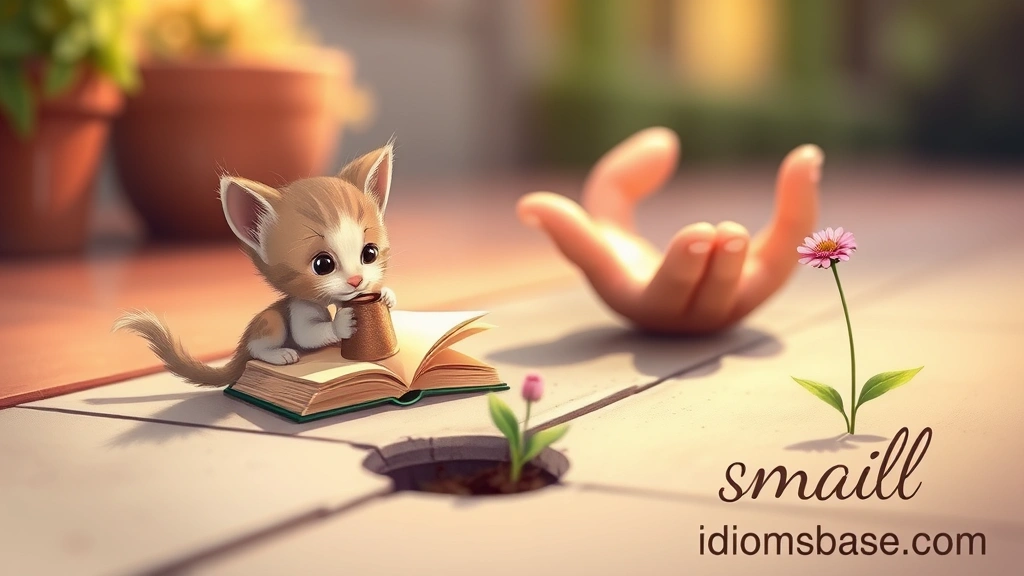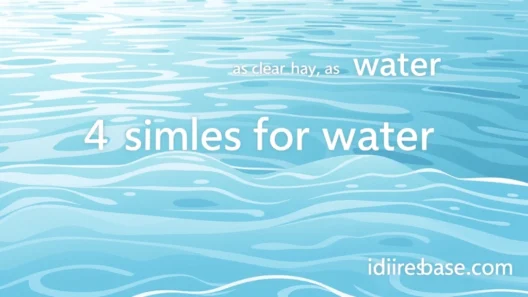Have you ever struggled to find just the right words to describe something tiny? That feeling of a word being almost perfect, but not quite hitting the mark? Well, you're in luck! We all know "small" is a simple word, but sometimes you need to paint a more vivid picture, don't you? Whether you're writing a story, crafting an email, or just trying to explain something to a friend, having a rich vocabulary at your fingertips can make all the difference.
Similes are fantastic tools for this! They allow us to compare one thing to another using "like" or "as," instantly creating a mental image that's both clear and creative. Today, we're diving into a treasure trove of 40 similes for "small" that will truly elevate your language. Get ready to sprinkle some linguistic magic into your everyday conversations and writing!
Why Are Similes So Powerful?
Think about it: when you say something is "small," it's accurate, but it doesn't really feel small, does it? A simile, on the other hand, adds a layer of emotion, a touch of humor, or a dash of wonder. It transforms a simple description into an experience. For example, "small as a pea" isn't just about size; it evokes the image of that tiny, round vegetable. It's relatable and memorable.
Using similes makes your communication more engaging and impactful. They help your audience grasp concepts quickly and keep them interested. Plus, they show off your creativity! So, let's explore some fantastic ways to describe "small."
40 Similes for "Small" You'll Love!
Here are 40 brilliant similes to help you describe anything tiny, from the minuscule to the miniature. We've categorized them to make it even easier for you to find the perfect fit!
H4 Similes for Extremely Small Things
These similes are perfect for when something is truly, incredibly tiny.
- As small as a pinhead: Think of the very tip of a pin!
- As small as a speck of dust: You can barely see it, right?
- As small as a grain of sand: Millions of these make a beach, but one is tiny.
- As small as an atom: The fundamental building block of everything – truly invisible!
- As small as a microbe: You need a microscope to see these little guys.
- As small as a proton: Even tinier than an atom's nucleus.
- As small as a dot: Just a tiny mark.
- As small as a flea: These little jumpers are hard to spot!
- As small as a mustard seed: Famously tiny, yet can grow into something large.
- As small as a crumb: The leftover bits from a biscuit or bread.
H4 Similes for Small Objects
These are great for objects that are just generally small, but still visible.

- As small as a pea: A classic, simple, and effective comparison.
- As small as a pebble: A little stone you might find on a path.
- As small as a button: Think of a tiny button on a shirt.
- As small as a thimble: Used for sewing, it fits on your fingertip.
- As small as a matchbox: A compact little box.
- As small as a walnut: A common nut, small and round.
- As small as a cherry: A delightful, bite-sized fruit.
- As small as a golf ball: Circular and fits in your palm.
- As small as a toy car: A miniature version of a real car.
- As small as a robin's egg: Delicate and perfectly formed.
H4 Similes for Small Creatures
When describing tiny animals or insects, these similes come in handy.
- As small as an ant: We all know how tiny ants are!
- As small as a ladybug: A cute, little beetle.
- As small as a hummingbird: The smallest bird, known for its rapid wings.
- As small as a mouse: A common small rodent.
- As small as a squirrel: Agile and quick, but not large.
- As small as a chick: A baby bird, fluffy and adorable.
- As small as a kitten: A young cat, full of mischief.
- As small as a tadpole: A baby frog, tiny and wriggly.
- As small as a minnow: A very small fish.
- As small as a beetle: Many varieties, but generally small.
H4 Similes for Small Spaces or Quantities
These similes are perfect for describing limited space or tiny amounts.

- As small as a closet: A confined space for clothes.
- As small as a shoebox: A box just big enough for shoes.
- As small as a teacup: A small container for liquid.
- As small as a drop of water: A single, tiny bit of liquid.
- As small as a pinch of salt: A very small amount.
- As small as a whisper: A sound that's barely audible.
- As small as a sliver: A tiny, thin piece.
- As small as a crumb of comfort: A minimal amount of solace.
- As small as a spark: A tiny, fleeting bit of fire.
- As small as a seedling: A very young, small plant.
How to Choose the Perfect Simile
With so many options, how do you pick the best one? Consider these factors:
- Context: What are you describing? A tiny creature? A minuscule object?
- Tone: Do you want to be funny, serious, poetic, or scientific?
- Audience: Will your audience understand the comparison?
- Impact: What kind of image or feeling do you want to evoke?
For example, "as small as an atom" might be great for a scientific context, while "as small as a kitten" is perfect for describing something cute and tiny.
Frequently Asked Questions (FAQs)

H4 What is a simile?
A simile is a figure of speech that directly compares two different things, usually by using the words "like" or "as." Its purpose is to make a description more vivid, imaginative, or emphatic. For instance, saying "The cloud was as white as snow" is a simile.
H4 How do similes differ from metaphors?
While both similes and metaphors are figures of speech that make comparisons, they do so differently. A simile states that one thing is like another (e.g., "brave as a lion"), whereas a metaphor directly states that one thing is another, implying the comparison without using "like" or "as" (e.g., "He is a lion in battle"). Metaphors are more direct and often create a stronger, more literal identification.
H4 Can I create my own similes?
Absolutely! The best similes are often original and unexpected. To create your own, think about the quality you want to describe (in this case, "smallness") and then brainstorm objects, creatures, or concepts that strongly embody that quality. Try to think outside the box for comparisons that are fresh and interesting. For example, "as small as a forgotten dream."
H4 Why is it important to use varied vocabulary?
Using a varied vocabulary, including similes, makes your writing and speech more engaging, precise, and sophisticated. It prevents repetition, adds depth to your descriptions, and helps you communicate your ideas more effectively. It also demonstrates your command of language, making your communication more impactful and memorable.
H4 Are there any common mistakes to avoid when using similes?
Yes, there are a few! Avoid clichés if possible; while some are effective (like "as small as a pea"), try to find fresh comparisons. Also, ensure your simile makes sense and is clear to your audience. Don't use comparisons that are too obscure or confusing. Finally, don't overuse them; a few well-placed similes are more effective than a string of them that can overwhelm the reader.
Key Takeaways
- Similes enhance descriptions: They transform a simple "small" into something vivid and relatable.
- Variety is key: Having many options allows you to choose the perfect fit for any context.
- Consider your audience and tone: Tailor your simile to who you're speaking to and the mood you want to set.
- Creativity matters: Don't be afraid to invent your own unique similes!
- Practice makes perfect: The more you use these linguistic tools, the more natural they will become.
So, there you have it! Forty incredible similes to help you describe "small" in a myriad of imaginative ways. We hope this list empowers you to be more creative and precise in your language. Go forth and sprinkle these fantastic comparisons into your writing and conversations! Which one is your favorite? Do you have any unique similes for "small" that you love to use? Share your thoughts with us in the comments below!





